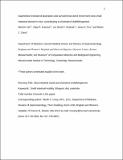Augmented cholesterol absorption and sarcolemmal sterol enrichment slow small intestinal transit in mice, contributing to cholesterol cholelithogenesis
Author(s)
Fox, James G.; Xie, Meimin; Kotecha, Vijay R.; Andrade, Jon David P.; Carey, Martin C.
DownloadVKotecha 083010 mod 112111.pdf (329.7Kb)
OPEN_ACCESS_POLICY
Open Access Policy
Creative Commons Attribution-Noncommercial-Share Alike
Terms of use
Metadata
Show full item recordAbstract
Cholesterol gallstones are associated with slow intestinal transit in humans as well as in animal models, but the molecular mechanism is unknown. We investigated in C57L/J mice whether the components of a lithogenic diet (LD; 1.0% cholesterol, 0.5% cholic acid and 17% triglycerides), as well as distal intestinal infection with Helicobacter hepaticus, influence small intestinal transit time. By quantifying the distribution of 3H-sitostanol along the length of the small intestine following intraduodenal instillation, we observed that, in both sexes, the geometric centre (dimensionless) was retarded significantly (P < 0.05) by LD but not slowed further by helicobacter infection (males, 9.4 ± 0.5 (uninfected), 9.6 ± 0.5 (infected) on LD compared with 12.5 ± 0.4 and 11.4 ± 0.5 on chow). The effect of the LD was reproduced only by the binary combination of cholesterol and cholic acid. We inferred that the LD-induced cholesterol enrichment of the sarcolemmae of intestinal smooth muscle cells produced hypomotility from signal-transduction decoupling of cholecystokinin (CCK), a physiological agonist for small intestinal propulsion in mice. Treatment with ezetimibe in an amount sufficient to block intestinal cholesterol absorption caused small intestinal transit time to return to normal. In most cholesterol gallstone-prone humans, lithogenic bile carries large quantities of hepatic cholesterol into the upper small intestine continuously, thereby reproducing this dietary effect in mice. Intestinal hypomotility promotes cholelithogenesis by augmenting formation of deoxycholate, a pro-lithogenic secondary bile salt, and increasing the fraction of intestinal cholesterol absorbed.
Date issued
2012-02Department
Massachusetts Institute of Technology. Department of Biological Engineering; Massachusetts Institute of Technology. Division of Comparative MedicineJournal
The Journal of Physiology
Publisher
Wiley Blackwell (Blackwell Publishing -The Physiological Society)
Citation
Xie, M. et al. “Augmented Cholesterol Absorption and Sarcolemmal Sterol Enrichment Slow Small Intestinal Transit in Mice, Contributing to Cholesterol Cholelithogenesis.” The Journal of Physiology 590.8 (2012): 1811–1824.
Version: Author's final manuscript
ISSN
0022-3751
1469-7793